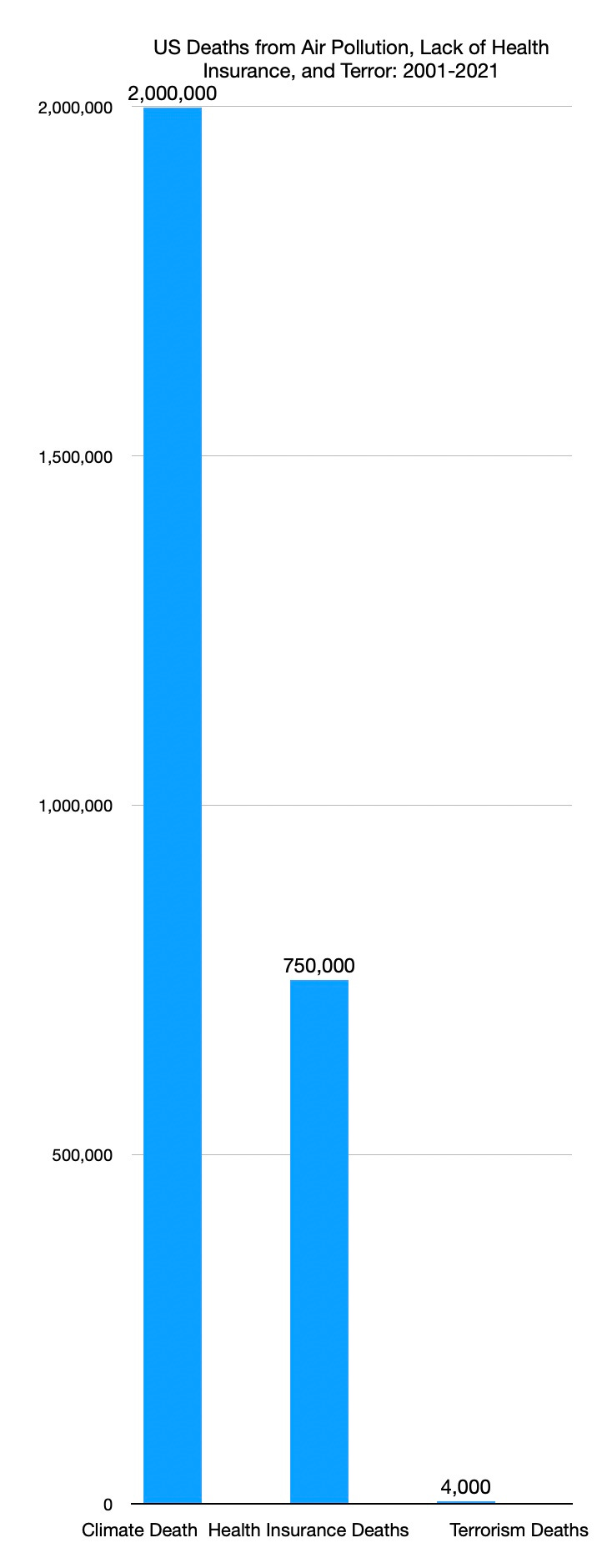Military vs Climate Spending: A Moral Catastrophe in Three Pictures (updated)
We're condemning millions with our choices.
The financial reconciliation agreement announced by the White House includes $555 billion for climate change, to be spent over the next ten years. The current level of federal spending on climate change is roughly $2.4 billion per year, making this an enormous boost in the government’s commitment to climate change.
Unfortunately, it’s also far less than what is needed to address the dawning catastrophe. Most of this expenditure comes in the form of tax breaks, rather than direct government spending. Our priorities still reflect a national blindness and madness.
Compare Biden's budget figure with what the US is projected to spend on the military over the same 10-year period:
Does that look like a reasonable balance to you?
Air pollution alone kills nearly 200,000 people in this country every year, according to a study in the Journal of the American Medical Association. Climate change kills us in many other ways as well, from groundwater pollution to forest fires, floods, and other forces. Figures like this show that, despite what our leaders say, our government doesn't value life.
These priorities don’t even make fiscal sense. Another study projects that climate change will cost the United States 1.8 percent of its Gross Domestic Product, or $1.9 trillion per year, by 2100. That sounds grim, and it is, but this projection is probably over-optimistic. It assumes that our political and social institutions will survive climate change, and that the costs will be manageable, if disastrous.
The next chart carries forward the president’s proposed climate spending and the military budget to the year 2100 (in today's dollars) and puts it alongside the projected cost of climate change to the United States that year (also in today's dollars):
Then there's the human cost. If we don't act, nearly 16 million Americans will die from air pollution by 2100. That figure might be lower but would not be eliminated by a small-bore proposal like Biden's.
We're not just choosing to let millions die, we're also ruining the future economy. More climate spending today (raising the right-hand column) could significantly lower the future cost of climate change (the left-hand column), making it a smart investment as well as a moral one.
The final chart (below) is a look backward over the last 20 years. Roughly 4,000 Americans died from terrorism during that period, including on 9/11 itself. Meanwhile, an estimated 750,000 people died during the same period because they didn’t have health insurance, and roughly 2 million died from air pollution.
That chart is below, but you’ll have to scroll a long way to reach its end, so we’ll conclude here. Our spending isn't just misguided; it’s immoral. Our choices today are condemning millions of people -- descendants -- to death.
This system won't change itself. It’s going to take action – lots of action. Join the Sunrise Movement, or Zero Hour (no connection to the radio show), or Extinction Rebellion (I’m a member, for what it's worth).
What student activist Mario Savio said in 1964, in a very different context, now must be applied to the machinery of human extinction:
“There's a time when the operation of the machine becomes so odious—makes you so sick at heart—that you can't take part. You can't even passively take part. And you've got to put your bodies upon the gears and upon the wheels, upon the levers, upon all the apparatus, and you've got to make it stop.”
Estimated climate deaths from air pollution: 200,000/yr x 20 years
Health insurance deaths: 45,000 per year until Affordable Care Act, then 30,000 per year (more detail on calculations here)
Terrorism deaths: 9/11, attacks on US civilians abroad, etc.
Needless to say, this chart is in no way meant to minimize a single death. Judaism and Islam both say that killing one person is the moral equivalent of killing an entire universe. But our wars are costing us lives, not saving them, and we are condemning future generations with our choices today.



